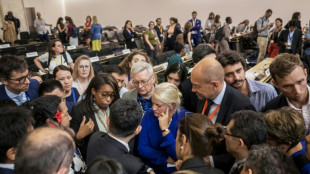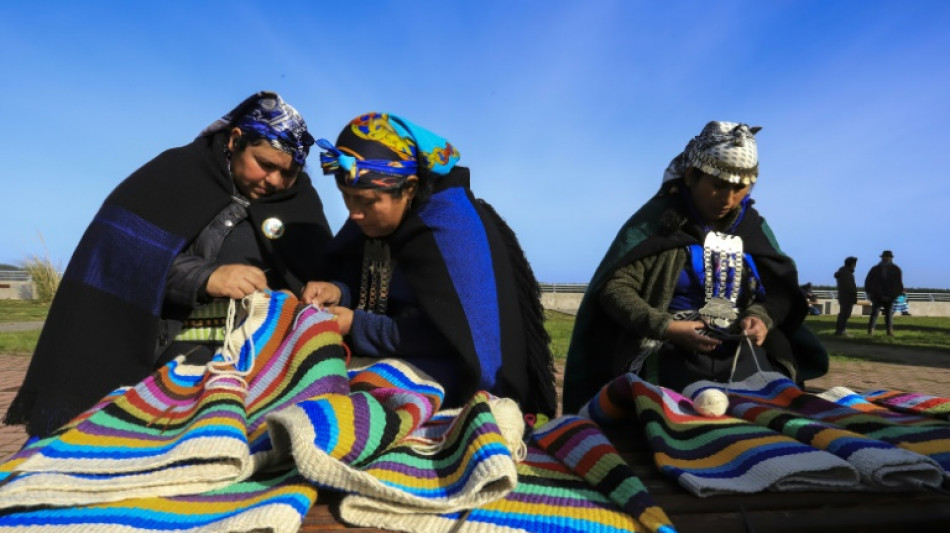
-
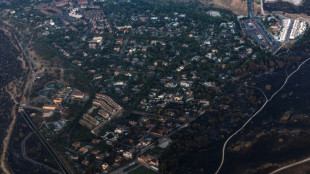 Spain PM vows 'climate pact' on visit to fire-hit region
Spain PM vows 'climate pact' on visit to fire-hit region
-
Serbia's president vows 'strong response' after days of unrest

-
 Brazilian goalkeeper Fabio equals Shilton record for most games played
Brazilian goalkeeper Fabio equals Shilton record for most games played
-
Warholm in confident swagger towards Tokyo worlds

-
 Air Canada to resume flights after govt directive ends strike
Air Canada to resume flights after govt directive ends strike
-
Israelis rally nationwide calling for end to Gaza war, hostage deal

-
 European leaders to join Zelensky for Ukraine talks with Trump
European leaders to join Zelensky for Ukraine talks with Trump
-
Downgraded Hurricane Erin lashes Caribbean with rain
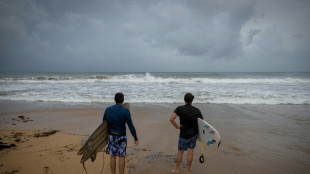
-
 Protests held across Israel calling for end to Gaza war, hostage deal
Protests held across Israel calling for end to Gaza war, hostage deal
-
Hopes for survivors wane as landslides, flooding bury Pakistan villages

-
 After deadly protests, Kenya's Ruto seeks football distraction
After deadly protests, Kenya's Ruto seeks football distraction
-
Bolivian right eyes return in elections marked by economic crisis

-
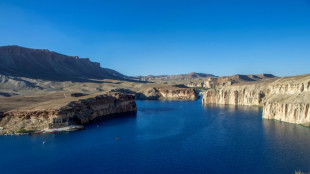 Drought, dams and diplomacy: Afghanistan's water crisis goes regional
Drought, dams and diplomacy: Afghanistan's water crisis goes regional
-
'Pickypockets!' vigilante pairs with social media on London streets

-
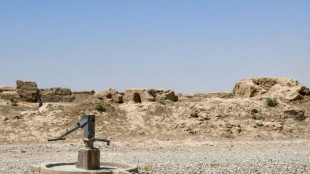 From drought to floods, water extremes drive displacement in Afghanistan
From drought to floods, water extremes drive displacement in Afghanistan
-
Air Canada flights grounded as government intervenes in strike

-
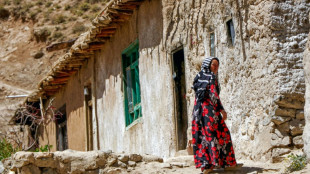 Women bear brunt of Afghanistan's water scarcity
Women bear brunt of Afghanistan's water scarcity
-
Reserve Messi scores in Miami win while Son gets first MLS win

-
 Japan's Iwai grabs lead at LPGA Portland Classic
Japan's Iwai grabs lead at LPGA Portland Classic
-
Trump gives Putin 'peace letter' from wife Melania

-
 Alcaraz to face defending champ Sinner in Cincinnati ATP final
Alcaraz to face defending champ Sinner in Cincinnati ATP final
-
Former pro-democracy Hong Kong lawmaker granted asylum in Australia

-
 All Blacks beat Argentina 41-24 to reclaim top world rank
All Blacks beat Argentina 41-24 to reclaim top world rank
-
Monster birdie gives heckled MacIntyre four-stroke BMW lead

-
 Coffee-lover Atmane felt the buzz from Cincinnati breakthrough
Coffee-lover Atmane felt the buzz from Cincinnati breakthrough
-
Coffe-lover Atmane felt the buzz from Cincinnati breakthrough

-
 Monster birdie gives MacIntyre four-stroke BMW lead
Monster birdie gives MacIntyre four-stroke BMW lead
-
Hurricane Erin intensifies offshore, lashes Caribbean with rain
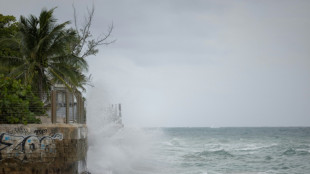
-
 Kane lauds Diaz's 'perfect start' at Bayern
Kane lauds Diaz's 'perfect start' at Bayern
-
Clashes erupt in several Serbian cities in fifth night of unrest

-
 US suspends visas for Gazans after far-right influencer posts
US suspends visas for Gazans after far-right influencer posts
-
Defending champ Sinner subdues Atmane to reach Cincinnati ATP final

-
 Nigeria arrests leaders of terror group accused of 2022 jailbreak
Nigeria arrests leaders of terror group accused of 2022 jailbreak
-
Kane and Diaz strike as Bayern beat Stuttgart in German Super Cup

-
 Australia coach Schmidt hails 'great bunch of young men'
Australia coach Schmidt hails 'great bunch of young men'
-
Brentford splash club-record fee on Ouattara

-
 Barcelona open Liga title defence strolling past nine-man Mallorca
Barcelona open Liga title defence strolling past nine-man Mallorca
-
Pogba watches as Monaco start Ligue 1 season with a win

-
 Canada moves to halt strike as hundreds of flights grounded
Canada moves to halt strike as hundreds of flights grounded
-
Forest seal swoop for Ipswich's Hutchinson

-
 Haaland fires Man City to opening win at Wolves
Haaland fires Man City to opening win at Wolves
-
Brazil's Bolsonaro leaves house arrest for medical exams

-
 Mikautadze gets Lyon off to winning start in Ligue 1 at Lens
Mikautadze gets Lyon off to winning start in Ligue 1 at Lens
-
Fires keep burning in western Spain as army is deployed
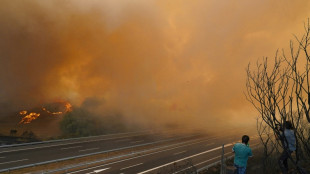
-
 Captain Wilson scores twice as Australia stun South Africa
Captain Wilson scores twice as Australia stun South Africa
-
Thompson eclipses Lyles and Hodgkinson makes stellar comeback

-
 Spurs get Frank off to flier, Sunderland win on Premier League return
Spurs get Frank off to flier, Sunderland win on Premier League return
-
Europeans try to stay on the board after Ukraine summit

-
 Richarlison stars as Spurs boss Frank seals first win
Richarlison stars as Spurs boss Frank seals first win
-
Hurricane Erin intensifies to 'catastrophic' category 5 storm in Caribbean
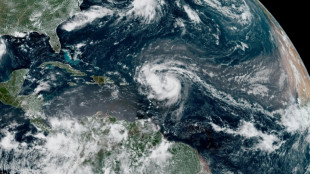

New study finds prehistoric migrations from China to Americas
As the last continents to be settled by humans, the question of how and when people first came to the Americas has long intrigued scientists.
A new genetics study published Tuesday in Cell Reports finds that some of the first arrivals came from China during two distinct migrations: the first during the last ice age, and the second shortly after.
"Our findings indicate that besides the previously indicated ancestral sources of Native Americans in Siberia, the northern coastal China also served as a genetic reservoir contributing to the gene pool," Yu-Chun Li, one of the report authors, told AFP.
Li added that during the second migration, the same lineage of people settled in Japan, which could help explain similarities in prehistoric arrowheads and spears found in the Americas, China and Japan.
It was once believed that ancient Siberians, who crossed over a land bridge that existed in the Bering Strait linking modern Russia and Alaska, were the sole ancestors of Native Americans.
More recent research, from the late 2000s onwards, has signaled more diverse sources from Asia could be connected to an ancient lineage responsible for founding populations across the Americas, including Bolivia, Brazil, Chile, Ecuador, Mexico and California.
Known as D4h, this lineage is found in mitochondrial DNA, which is inherited only from mothers and is used to trace maternal ancestry.
The team from the Kunming Institute of Zoology embarked on a ten-year hunt for D4h, combing through 100,000 modern and 15,000 ancient DNA samples across Eurasia, eventually landing on 216 contemporary and 39 ancient individuals who came from the ancient lineage.
By analyzing the mutations that had accrued over time, looking at the samples' geographic locations and using carbon dating, they were able to reconstruct the D4h's origins and expansion history.
The results revealed two migration events. The first was between 19,500 and 26,000 years ago during the Last Glacial Maximum, when ice sheet coverage was at its greatest and climate conditions in northern China were likely inhospitable.
The second occurred during the melting period, between 19,000 and 11,500 years ago. Increasing human populations during this period might have triggered migrations.
It was during this second migration that the scientists found a surprising genetic link between Native Americans and Japanese people, particularly the indigenous Ainu.
In the melting period, a subgroup branched out from northern coastal China to Japan, contributing to the Japanese people, the study said, a finding that chimes with archeological similarities between ancient people in the Americas, China and Japan.
Li said a strength of the study was the number of samples they discovered, and complementary evidence from Y chromosomal DNA showing male ancestors of Native Americans lived in northern China at the same time as the female ancestors, made them confident of their findings.
“However, we don't know in which specific place in northern coastal China this expansion occurred and what specific events promoted these migrations," he said.
“More evidence, especially ancient genomes, are needed to answer these questions."
K.Thomson--BTB


